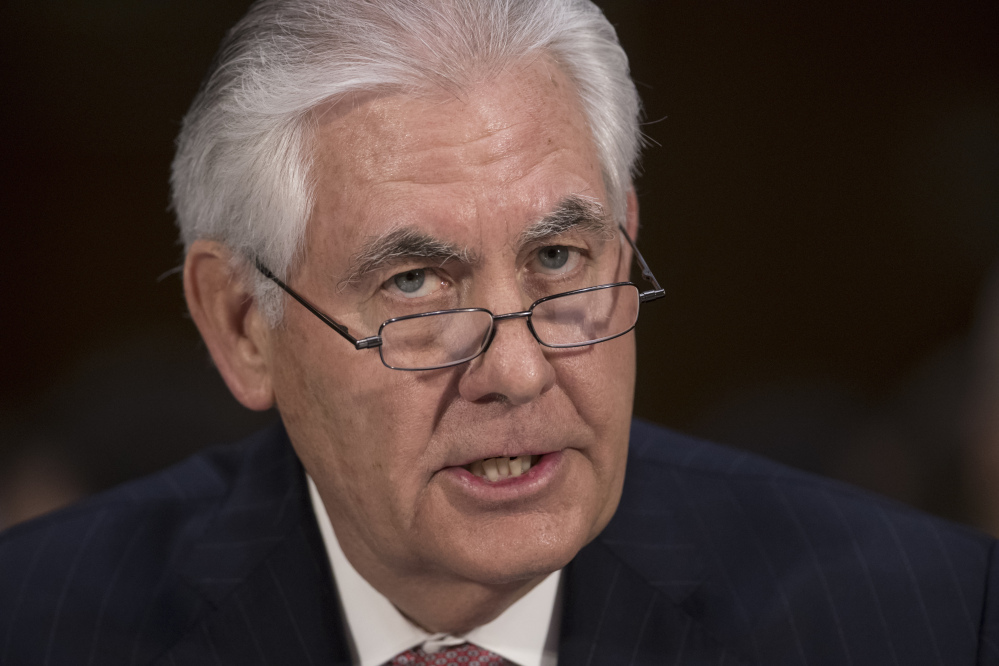WASHINGTON — Rex Tillerson’s bid to be secretary of state narrowly won approval Monday from the Republican-led Foreign Relations Committee, a move that all but ensures Senate confirmation of President Donald Trump’s choice to be the nation’s top diplomat.
Members of the committee voted along party lines, 11-10, to back Tillerson after a contentious confirmation hearing nearly two weeks ago that stoked concerns he might not win the panel’s recommendation. But just hours before members cast their votes, Sen. Marco Rubio, R-Fla., declared his support for Tillerson, backing off from a challenge to the new president.
Rubio said that despite serious reservations about Tillerson, particularly over his views on Russia, he believes a president is entitled to significant deference in assembling his Cabinet.
None of the committee’s 10 Democrats voted for Tillerson. They cited concerns that Tillerson would continue to view the world through the lens of a corporate executive and not the nation’s chief diplomat.
Sen. Ben Cardin of Maryland, the panel’s top Democrat, said Tillerson “equivocated” during his confirmation hearing on questions about human rights, civil society and press and religious freedoms, and repeatedly prioritized “narrow business interests ahead of these core national security interests.”
Every nominee for the job going back at least four decades has been approved by overwhelming votes from both sides in the Foreign Relations Committee, as senators have traditionally wanted to deliver a bipartisan display of confidence to the nation’s top diplomat. No other nominee since 1977 has received more than two “no” votes from the committee.
Sen. Bob Corker of Tennessee, the committee’s Republican chairman, said he has “no doubt” Tillerson is well-qualified, citing his leadership of the energy giant. Corker chided his colleagues who had demanded information about Tillerson’s personal taxes, saying the material had been used to ask “silly, silly questions.”
Rubio announced he would vote for Tillerson in a statement posted on Facebook. “Despite my reservations, I will support Mr. Tillerson’s nomination in committee and in the full Senate,” said Rubio, who’d come under strong pressure from fellow Republicans to back the nomination and avoid dealing Trump an embarrassing setback in the early days of his presidency.
Rubio clashed with Tillerson at a committee hearing this month, bridling at his refusal to label Russian President Vladimir Putin a “war criminal” and his failure to condemn human rights violations in Saudi Arabia and the Philippines in strong enough terms. He chided Tillerson over the need for “moral clarity.” But in the end, after unsuccessfully opposing Trump for the Republican nomination last year before coming around to support him, Rubio decided to fall in line this time, too.
His statement came after the nomination got a boost on Sunday from two influential Republican senators, John McCain of Arizona and Lindsey Graham of South Carolina, who also offered tepid endorsements for Tillerson. Like Rubio, McCain and Graham had voiced concerns in light of Tillerson’s long history of personal dealings with Putin, his record of doing oil deals in Russia and his questioning of the U.S. sanctions on that country.
Sen. Chris Coons, D-Del., said he was encouraged by several of Tillerson’s public stances, including “his clear-eyed understanding of the threat posed by Putin’s Russia” and his commitment to NATO. But Coons said the differences on key issues between himself and Tillerson two outweighed the similarities.
“I believe that climate change is a pressing national security threat,” Coons said. “I believe that advocating for human rights, a free press, and democracy around the world advances our own security and economic interests here at home.”
Further roiling the debate is U.S. intelligence’s assessment that Russia meddled in the presidential election to help Trump defeat Hillary Clinton.
Even while announcing his support for Tillerson, Rubio laid out a series of concerns in his statement Monday.
“Despite his extensive experience in Russia and his personal relationship with many of its leaders, he claimed he did not have sufficient information to determine whether Putin and his cronies were responsible for ordering the murder of countless dissidents, journalists and political opponents,” Rubio said of Tillerson. “He indicated he would support sanctions on Putin for meddling in our elections only if they met the impossible condition that they not affect U.S. businesses operating in Russia.”
Send questions/comments to the editors.



Comments are no longer available on this story